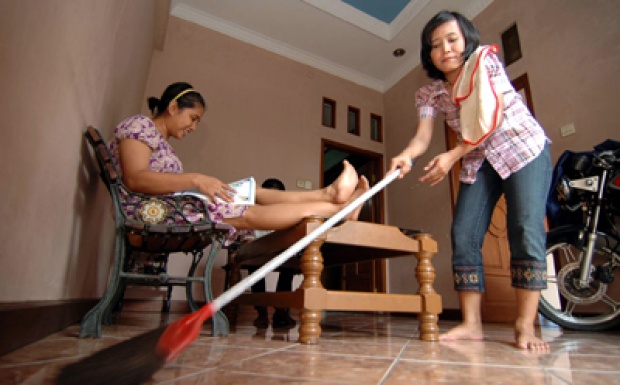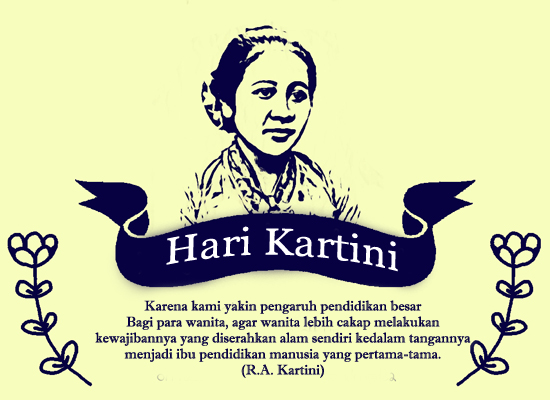Arriving in Indonesia often means acquiring household help for the first time. This can be a daunting prospect and fears about the loss of privacy, difficulty in management and harmonious relationships often arise.
This culture has a long history of using household help among both Indonesia and Expatriates. It is profession viewed favorably by the Indonesia people. The wage and benefits received by many household staff equal or exceed that earned by those in other professions.
The word for household staff is PEMBANTU, from the verb BANTU, to help.
Cultural Sensitivity
One must develop an understanding of Asian concept of Face and Javanese behavior. “Halus” is the word for desirable behavior, Quiet, Smiling, non-disruptive. Javanese retreat from emotional display and show anger only indirectly. A loss of temper or raised voices will shock and are seen as loss of face.
Apologies are difficult and my be presented as a feeble excuse and accompanied by a giggle. This is done out of embarrassment, not a sense that the event is funny. Giggling also occurs in cases of sadness or distress. Giving bad news is avoided.
The educational system is based on learning by rote. Instruction need to be given slowly and carefully, with repetition. It is impolite to say, “no’ or “I don’t interpreted as “I heard you speak to me’
Never shame the staff in front of others, or accuse them directly, as this will cause a severe loss of face.
Family ties are the root of the culture. Family members help each other in every possible way. A good portion of your staff’s salary may be going to other members of this/her family.
Personal Requirement
The number of household staff varies greatly defending on the size of the house, the number of family members, amount of entertaining etc. It is far easier to add than to subtract.
Common members of a household staff include – Cook, Gardener, Guard, Maid, Nanny and Laundry person. These positions may be combined or divided as necessary. For example a small family of two or three may only need a cook/maid and jaga/gardener. The vast majority of households usually employ a driver. Some staff ‘live in’ while others are day help only.
How To Find Help
-
Friends and their staff.
-
Staff already employed will often be able to assist you. The advantage is that they will get along well and probably work well together.
-
Departing expatriate’s advertisements on school notice boards, Hero, Kemchiks.
-
ICAC has a registry of staff. Detail are available from ICAC Office – 7581 6710.
-
Check with your company before hiring staff as many will provide a driver as well security.
Employing Staff
Prospective staff will know what they want, so you must be prepared by:
-
Knowing how mush you are willing to pay: salary, medical, clothing/uniform, food, transportation for those who live out, holidays period.
-
Considering if you require the person to communicate in English and whether they are able to read write.
-
Laying down rules in regard to staff visitors. For example, are they permitted to have visitors during the day or night and up to what time. Should they be introduced to you?
-
Deciding whether staff may make and receive phone calls.
There are always options and alternative. You need to assess what will work best for you. Sample contracts will give you help in deciding on benefits.
Scrutinize letters of reference very closely and check identity card. Be aware that references are not always what they seem. Be sure to interview several applicants for each position – short interviews and hastily hired staff can lead to disaster.
Staff living in will need beds, basic furniture, bedding and kitchen equipment.
Consider having medical check-ups before confirming permanent employment, especially for a cook, or one who will care for your children. Include testing for tuberculosis, and hepatitis B. The Newcomers Resources Center has sample forms in English and Indonesia available. If medical check ups are required the employer pays and specifies the content of the exam. SOS Medika provides excellent physicals for household staff at reasonable prices.
Record Keeping
Maintain a notebook of records on staff members. Consider including :
-
Name and permanent address
-
Photocopy of identity card (KTP)
-
Photocopy of driver’s license for your driver(s) (SIM)
-
Records of medical treatment
-
Records of loans and repayments, if you make loans
-
Salary with date paid
-
Dates and amount of Salary increases
-
Time off for holidays, illness, vacation, etc.
Work Schedules
It is your home, you set the requirement for it. Avoid being influenced or intimidated by what others do. Staff cannot be expected to work around the clock without any breaks or social time. They also have friends and families. Most staff members prefer to do the heavy cleaning very early in the morning while it is still cool. A break is then taken in the heat of midday and work resumes later in the heat of midday and work resumes later in the afternoon through your evening meal.
Staff receive one day off during the week, but the need not be all away at the same time. Muslim staff will expect time off for Lebaran and if they are practicing Muslims will need a few minutes five times a day for prayer and possibly an hour on Friday afternoons to go the Mosque.
Holidays
Two weeks annual leave is usual after a full year of employment, pro-rated before. This may be taken while the family is on holiday, but be sure to stagger the dates so you always have someone in the house. Some staff take their vacation at he time of the Muslim holiday of Idul Fitri, and receive some additional time off when the family is on home leave.
Red Dates on the Calendar. Public holidays are scattered through the year. Decide which you will recognize and give the day off or if you will offer extra pay or an alternate day off.
Ramadhan an Lebaran / Idul Fitri : The Muslim fasting mouth of Ramadhan will have an impact on your household. Fasting begins at dawn and continues until sundown. During this time nothing is to enter the body : Not foot, no drink, no tobacco. Because of the heat, this results in greater fatigue, especially in the late afternoon. Drivers need a careful eye. Be certain they are alert when behind the wheel. Idul Fitri or Lebaran marks the end of Ramadhan. This is a two day celebration when families gather. Your staff will definitely want some time off. You may stagger the leave to be certain the house is covered. Staff are paid a 13th month salary during Ramadhan, a bonus. This is a government regulation. If they have not been with you a full year, the amount is pro-rated. The dates for dates for these events move or calendar, coming forward approximately 10 days each year.
Salaries and Allowances
The monthly pay usually includes the basic salary, paid once or twice a mouth, plus various optional allowances for food and clothing (Once or twice a year). A 13th month bonus is paid during Ramadhan (pro rated for the length of services if less than on year).
Medical care may be handled in several ways. A set amount per year, as needed, or payment of an allowance each month.
A small raise is usually given after the initial trial period, thence yearly. The amount of the raise is usually 10% but this is at the discretion of the employer.
Extra payment is given in the event a large or houseguest. The amounts may very greatly depending on size of party, time frame and length of stay of overnight guest.
Staff and Children
Indonesians love children and their views on discipline are different from ours. They avoid saying no and are uncomfortable when they see a child unhappy. The may try influence by telling frightening stories, or bribing with sweets. Your rules will need to be carefully explained. Indonesian children are carried a great deal even throughout the toddler stage. If you want your child free to discover and be more independent, you will need to explain this as well.
All homes contain hazards to children : Electrical outlets, chemicals, kitchen/ garden equipment, perhaps a swimming pool. It is your and your child’s best interest to childproof your house. Stress with you staff, the dangers and your expectations.
Make sure your childcare provider is confident on the telephone, has numbers for you, or your friends in case of emergency, as well as your clinic. Be certain she or he knows where the clinic is located and has money in case a taxi must be used to transport a child who is ill or injured.
Children should be taught to respect your staff, not order them about or abuse then in any way.
Termination
Occasionally it may be necessary for you to terminate the employment of a staff member. This should be done privately, without raised voices. Any salary owing must be paid along with severance pay equal to one month for every year service. Be business like. Watch the person pack his or her belongings, and be certain they leave the property. Generally this is all done on the same day. Servants rarely “quit” because doing so eliminates their severance pay. If they are unhappy, they are more likely to give you subtle signs of discontent : A decease in the quality or quantity of work, not turning up regularly, increasing requests for leave, marked frequency of sick days.
Working Relationships
You are the household manager and staff are your employees. They expect you to be business like with them and will respect your for doing so. The system of hierarchy demands that you maintain some distance. They are not comparable if you become familiar. Tell them how to make you happy and they will do their very best to do so. Let them know often, if you are pleased with them and their work. Everyone appreciates a compliment. This is YOUR home. Enjoy your freedom!





